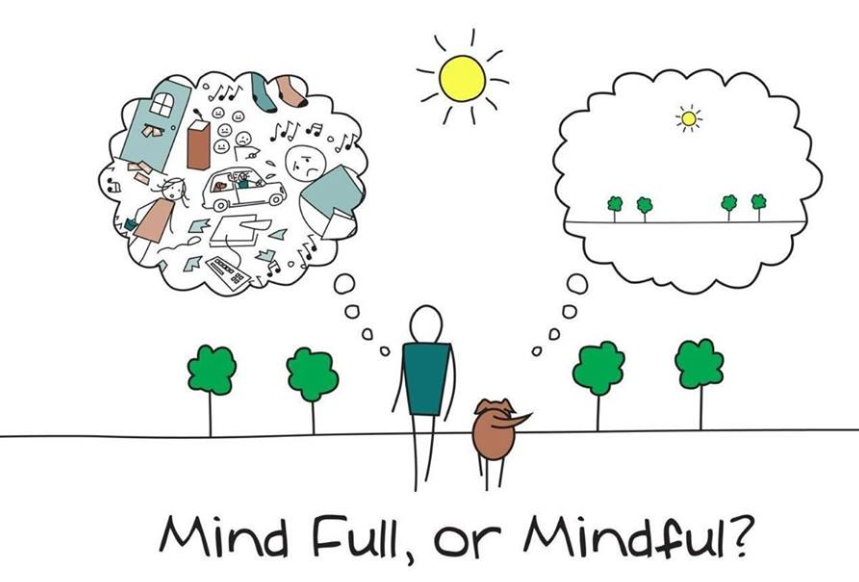In teaching leadership skills and coaching Tech leaders, I notice that like most of us, they have recurring habits of thought that do not serve them well. Our minds run on automatic pilot most of the time. We are extremely habit-driven pattern generating machines.

Mindfulness Meditation in the business world helps Managers and other Leaders clear their minds of stress and distorted thinking.
We often don’t notice our most troublesome patterns because the very “software” that is watching for patterns is the same “software” that has set up the filters for what to watch for. Our minds often jump to premature and distorted beliefs and those beliefs fall prey to confirmation bias— we tend to see what we expect to see and ignore what we don’t want to see. Because of this we don’t realize that our own ego minds are self-justifying systems, and we don’t recognize that we are not synonymous with our ego minds.
For example, Dave is a project manager who had some unwanted mindless habits. He wanted to do a great job, so he often said “Yes” to projects and tasks that were more than he could manage, and he found himself overwhelmed and frustrated. Then his mind jumped automatically to blaming others for his stressful circumstances. “Other people are just not as conscientious about their work as I am,” he told himself and his boss. He felt resentful of coworkers whom he saw as lazy and rebellious, and his blaming attitude did not endear him to his team.
The problem wasn’t with Dave’s external situation, although he thought it was; other people had managed his team before him and had not had these difficulties. The problem was that Dave was blind to his own mind’s natural tendency to look outside itself for others to blame for the stress that he had brought upon himself. Fortunately, Dave became aware of this pattern and was able to alter it when we introduced him to mindfulness practice at work.
Mindfulness practice entails meditation, ego observation, and change skills. These tools have taken off in the business world of late because they help executives and leaders better deal with stressful, constantly changing situations as well as clean up the “software” of the human organism, so that they create fewer cognitive biases and projective mistakes. We can use mindfulness to help us do this.
In order to change ourselves and our situations for the better, we need to align our mental models of the world with the truth about the way the world actually works. Seeing reality can be difficult; our confirmation bias runs so quickly and automatically that we are practically unaware of our automatic interpretations. Like putting on your shoes in the morning, you don’t think about it, you just do it, and that is where the trouble starts. But we can never change what we have not fully recognized. We have to admit where we are now in order to get to where we want to go next.
Mindfulness meditation creates a real opportunity for deep and lasting change by helping us dig deeply into the distortions and lies our minds are constantly telling us. By learning some basic tools of self-observation and meditative “following the breath,” practitioners begin to step back from their old way of thinking, becoming more true to themselves and more flexible in their choices of how they respond to situations. As a bonus, they become more authentically aligned with who they really are down deep inside. This is supportive of ethical behavior as well as long-term happiness.
I began working with Dave by getting him to journal about the situation with his coworkers as he saw it. Then I invited him to recognize the difference between his felt sense of who he was in this stressful situation and the “observer” consciousness that was aware of that “felt sense” of himself. By identifying with the observer instead of his ego, Dave was able to get some distance from his automatic negative emotional reactions. It was only then that he realized that he had been blaming his team, although his own lack of effective communication, combined with his unspoken expectations, was resulting in their confusion. On top of that, he could suddenly see that they were afraid to ask for clarification because he had often replied to their questions in a frustrated tone.
By practicing mindfulness, Dave became much calmer and learned to observe the processes of his mind, and he recognized that his behavior was not the totality of who he was. He became aware of how automatically his habits of mind ran away from what he was trying to will himself to do. This was the first step in strengthening his real will, and he recognized how he could interact more positively and successfully with his team.
We all hold onto patterns of thought, emotions, and behavior that don’t actually serve us. If you would like to learn to work day-to-day from your deep authentic self instead of having to constantly manage all of the ego masks/roles you play; if you are are tired of the stress; if you are ready to try being real, then you are ready to learn Authentic Leadership Skills. Give me a call. Let’s talk. 512-507-5464


